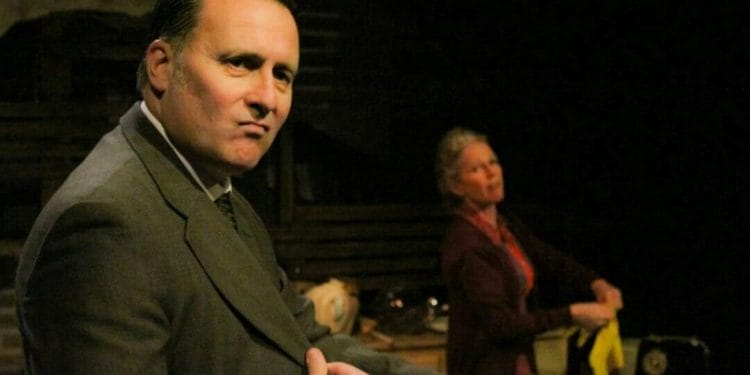 The Ruffian On The Stair may never have gained the notoriety of Joe Orton’s later plays, such as Loot or What The Butler Saw, but this stage adaptation of a novel turned radio play captures the themes, and wicked black comedy which would characterise Orton’s short writing career. This latest revival, under the direction of Paul Clayton, runs at Islington’s Hope Theatre.
The Ruffian On The Stair may never have gained the notoriety of Joe Orton’s later plays, such as Loot or What The Butler Saw, but this stage adaptation of a novel turned radio play captures the themes, and wicked black comedy which would characterise Orton’s short writing career. This latest revival, under the direction of Paul Clayton, runs at Islington’s Hope Theatre.
It’s the ideal venue really, and for more reasons than one. Firstly, The Ruffian On The Stair is set in a 1967 Islington bedsit, meaning we are literally watching the play where it’s set. For those familiar with The Hope Theatre, you’ll know that it’s a very intimate space, so the authentic lodgings really do feel cramped, and Rachael Ryan’s design puts you in the very fringes of the action.
As a one-act play, it does a wonderful job of taking a rather complex trio of characters, placed in an unusual situation, and allowing their story to unfold naturally, but at pace. The occupants of the bedsit are unmarried couple, Mike and Joyce. Both have dubious pasts, Joyce is a former prostitute now reveling in domestic bliss, while Mike earns a living as a contract killer, mowing his victims down in a white van.
But their world is about to come crashing down when a mysterious young man named Wilson appears out of the blue. His brother, with whom he was having an incestuous affair, was Mike’s last victim. Wilson is looking for an unusual form of revenge, and to achieve that he must first play psychological games with Mike and Joyce.
Despite the rather disturbing plot, which was undoubtedly shocking when the play was first staged, it’s also outrageously funny, there are so many one-liners, which require little or no set up, but land perfectly. It’s also a chilling examination of consequence, and again Ryan’s stripped back walls and claustrophobic staging draws the audience into this demi-underworld.
Gary Webster and Lucy Benjamin work wonderfully together, they embrace Orton’s magnificent use of language, perfectly pitching the rhythm and tone. The characters are brought to life in the tiny movements or vocal affectations which could be easily missed, yet vital to the overall performance. Adam Buchanan gives a stunning interpretation of Wilson, his slightly effeminate mannerisms making each cutting comment or biting glance all the more damning. He confidently ramps up the tension with each appearance, balancing the humour with the nail-biting suspense and discomfort.
Whether you are familiar with Joe Orton’s work or not, The Ruffian On The Stair though aged, will still feel shocking and unfamiliar, even in these modern times. It’s been attentively designed and directed to achieve the maximum impact with its audience. The intelligent interpretations of the characters by the cast helps cement this article in play as a working-class tragedy.



















